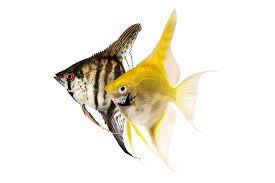
Angelfish
Conditions of detention
Angelfish require a tall tank due to their height, with a minimum of 20 gallons for a single fish, although larger tanks are preferable, especially if housing a pair or a group. They prefer slightly acidic to neutral water with a pH between 6.5 and 7.5 and a temperature range of 75-82°F (24-28°C). Angelfish thrive in a well-planted aquarium with plenty of vertical swimming space, subdued lighting, and gentle water flow. They appreciate having hiding spots among plants and decorations, which also help reduce stress.
Useful Fact: Angelfish are territorial, especially during breeding, so providing ample space and hiding spots can help reduce aggression.
Nutrition and diet
Angelfish are omnivorous and require a varied diet. They thrive on a mix of high-quality flake or pellet food, supplemented with live or frozen foods like brine shrimp, bloodworms, and daphnia. They also enjoy vegetable matter, which can be provided through blanched spinach, zucchini, or algae wafers.
Useful Fact: Feeding Angelfish a varied diet that includes both protein and plant matter helps maintain their health and vibrant coloration.
Health
Angelfish are generally hardy, but they can be susceptible to common freshwater fish diseases such as ich, fin rot, and hole-in-the-head disease (a condition associated with poor water quality and diet). Stress from poor water conditions, overcrowding, or aggressive tankmates can also lead to health issues.
Useful Fact: Regular water changes (about 20-30% weekly) and maintaining good water quality are essential for preventing health problems in Angelfish.
Grooming and care
While Angelfish do not require traditional grooming, maintaining a clean and stable environment is crucial. Regular water changes, filter maintenance, and monitoring water parameters are key aspects of their care.
Useful Fact: Angelfish appreciate a tank with tall plants or vertical decorations that mimic their natural habitat and provide them with security.
Education and training
Angelfish are intelligent and can learn to recognize their owners. They may come to the front of the tank during feeding times and can be conditioned to respond to specific cues, such as tapping the tank gently.
Useful Fact: Angelfish can form bonds with their owners and may display curiosity by approaching the tank glass when you’re nearby.
Toys and entertainment
Angelfish enjoy exploring their environment, so providing them with live plants, driftwood, and other decorations can keep them entertained. They also benefit from open swimming areas where they can glide gracefully through the water.
Useful Fact: Rearranging decorations occasionally can stimulate your Angelfish’s curiosity and reduce boredom.
Safety
Angelfish can be semi-aggressive, particularly during breeding or if housed in a small tank. It’s important to provide them with plenty of space and to choose tankmates carefully. They do well with other peaceful, similarly-sized fish but may nip at smaller or slow-moving species.
Useful Fact: Avoid keeping Angelfish with fin-nipping species like barbs, as their long fins can be a target for aggression.
Accessories
Essential accessories for an Angelfish tank include a reliable filter, a heater to maintain a stable temperature, and a light source that supports plant growth. Tall plants, driftwood, and rocks create a natural, comfortable environment for Angelfish.
Useful Fact: Angelfish prefer subdued lighting, which can be achieved with floating plants that diffuse the light and create a more natural ambiance.
Socialization
Angelfish are social but can be territorial, especially during breeding. They do well in groups, but it’s important to ensure that the tank is large enough to accommodate their territorial behavior. Keeping them in groups of five or more can help spread out aggression and reduce stress.
Useful Fact: When keeping a group of Angelfish, ensure the tank is spacious enough to prevent territorial disputes, particularly if they begin to pair off and breed.
Travel and Transportation
When transporting Angelfish, use a large, well-oxygenated container filled with water from their tank. Due to their height and delicate fins, they should be handled carefully to avoid injury. Keep the container stable and insulated to prevent temperature fluctuations during transport.
Useful Fact: Angelfish are sensitive to changes in water temperature and quality, so acclimate them slowly when introducing them to a new tank after transportation.
Behavior and psychology
Angelfish are known for their graceful swimming and territorial nature. They are curious, social, and can become quite attached to their environment. During breeding, they become more aggressive and will protect their territory vigorously. Angelfish communicate through body language, displaying their fins and changing their posture to assert dominance or attract mates.
Useful Fact: Angelfish may exhibit aggression toward each other during breeding, so providing plenty of space and hiding spots can help reduce stress.
Legal aspects
There are generally no legal restrictions on owning Angelfish, but it’s important to source them from reputable breeders or suppliers to ensure they are healthy and ethically raised.
Useful Fact: Many Angelfish available in the aquarium trade are captive-bred, which helps reduce the pressure on wild populations and often results in hardier fish.


